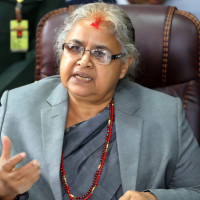- Wednesday, 11 February 2026
Barmajhiya: How a backwater earned fame for sweet Peda
By Dhirendra Prasad Sah,Janakpur, Feb. 24: In the bustling market of Barmajhiya of Saptari district, along the East-West Highway, the sweet aroma of 'Peda' fills the air. This is where, 60 years ago, late Baijnath Sah’s father started a small snack shop which now has grown into a renowned brand – 'Barmajhiya's Peda', creating jobs for thousands and generating millions in business. Barmajhiya’s Peda is not just famous by name; its taste and quality have earned it a reputation across Nepal and India.
The Baijnath Peda Shop, now a well-established brand in Barmajhiya, has been handed down to the third generation. After Baijnath’s passing on August 3, 2012, his son took over the business and now his grandson continues the legacy. Located in Kanchanrup Municipality-2, the shop is run by Rajkumar Sah, Baijnath’s younger son, a retired teacher. Rajkumar has since passed the responsibility to his elder son, Bibek.
Humble business grows incredibly
The story of Baijnath’s Peda shop began as a small snack stall. Baijnath’s father, the late Akal Sah, used to sell simple items like chickpeas, beaten rice and pickles near the Koshi riverbank around 1953. During a visit to Bihar in India, Baijnath learned the art of making Peda and brought the skill back home, transforming the small stall into a Peda business during 1955-56.
The business 'Shri Baijnath Peda Bhandar' started with just Rs. 100 about seven decades ago has now earned reputation as a famous brand. Barmajhiya’s Peda is now famous not just locally but internationally. Around 100 Peda shops operate here, using terms like 'original', 'old', and 'Baijnath' to attract customers.
However, Baijnath’s Peda is widely regarded as the 'real deal'. The business isn’t just about profits; it has created thousands of jobs and self-employment opportunities. Each shop employs four to eight workers which has positive impacts on the local economy.
The Peda-making process
Peda is made using pure milk and 'Khuwa' (solidified milk). According to Rajendra Sah of Baramjhiya, 20 kg of Peda requires 100 kg of milk. On average, a shop sells 50 to 70 kg of Peda (priced at Rs. 1000/kg) in a day.
This means a single shop can earn up to Rs. 50,000 daily. Collectively, Barmajhiya’s Peda shops generate around Rs. 5 million in sales daily, consuming 40,000 litres of milk. They buy milk at Rs. 70-80 per litre.
The Peda business has also boosted cattle farming and milk collection in the area. To meet the demand for milk, partnerships have been formed with milk collection centres in Fattepur, Mahuli and other localities. This has not only increased business for farmers and milk collection centres but also encouraged cattle farming in Barmajhiya and nearby villages.
Baijnath’s Peda shop is more than just a business success; it’s a symbol of cultural and economic transformation. What started as a small snack shop has become a source of livelihood for thousands and a thriving business worth millions of rupees. The sweet legacy of Barmajhiya’s Peda continues to grow, bringing prosperity to the region.














